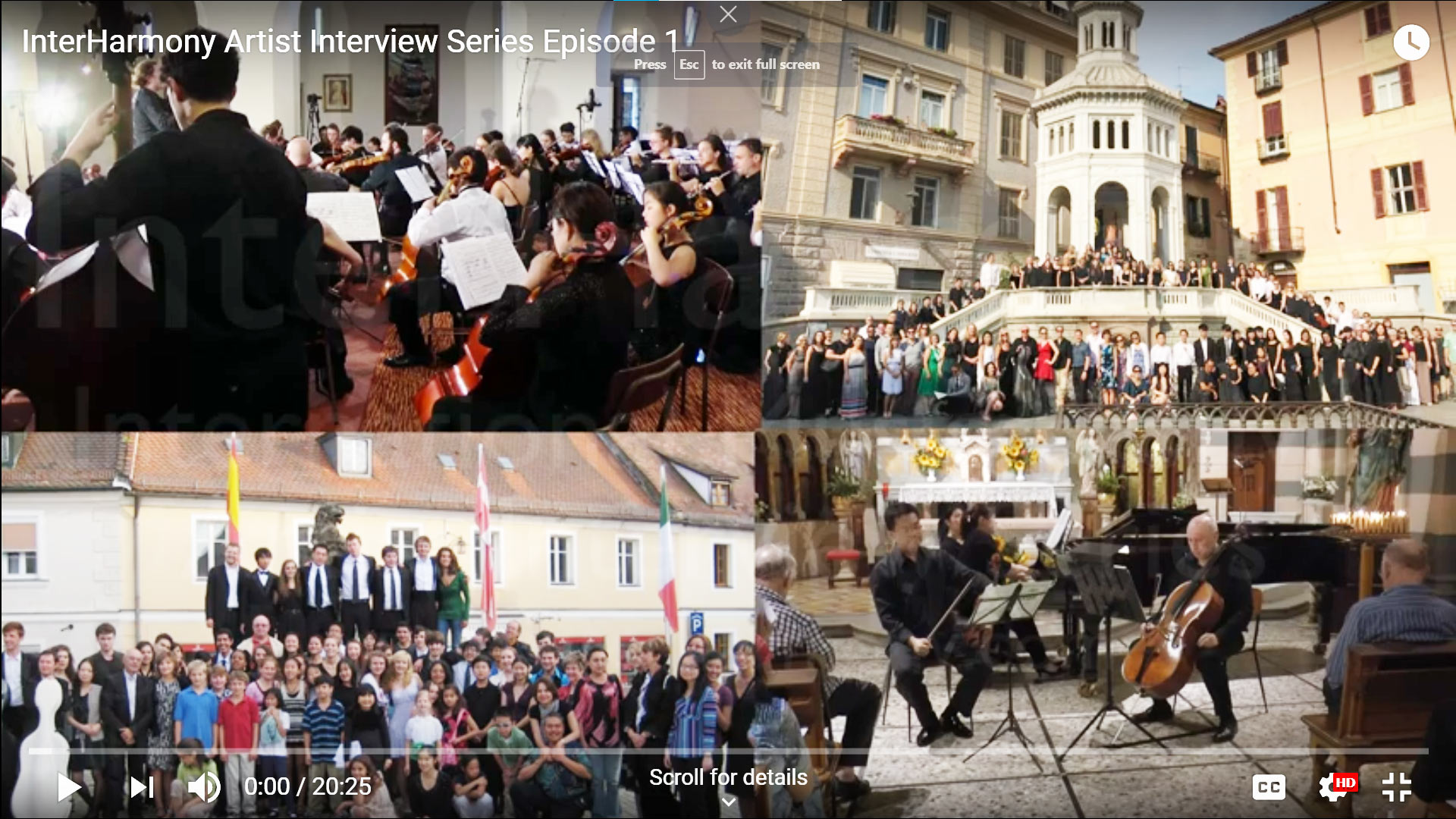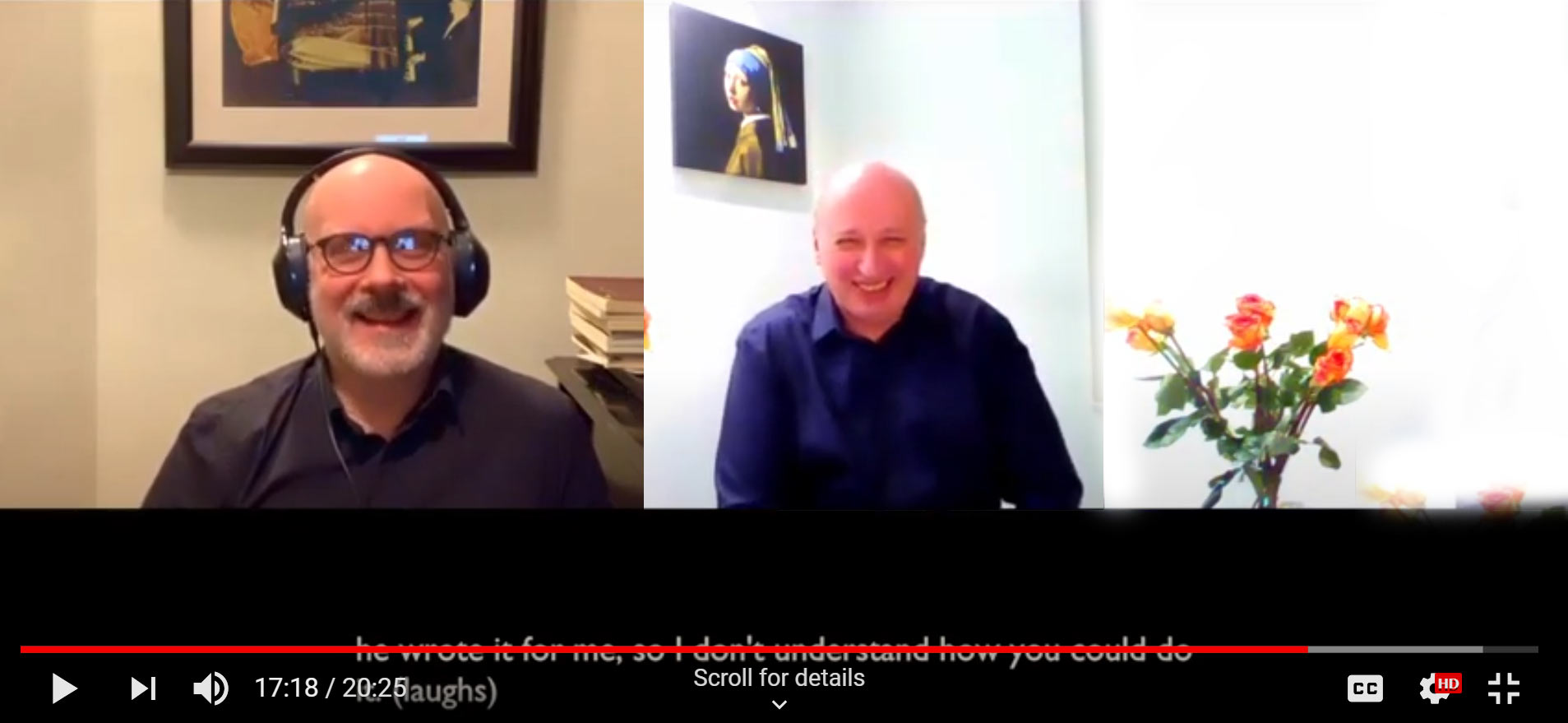InterHarmony Artist Interview Series
Optimism in Triumphant Beethoven
Classical Music Making Waves
Gerardo Teissonniere (piano) and Misha Quint
(cello), Episode I
Music Director and Cellist Misha Quint is joined by pianist Gerardo Teissonniere as they discuss their experience with the secrets of playing Beethoven, Saint-Saens, and Shostakovich. They discuss exciting new innovations in online teaching, technology, and musical practice during the past year, and of course InterHarmony International Music Festival Online. Watch until the end and make sure you have selected HD! Click on the Magnifying Glass to Watch the Video or click HERE.
Episode I: Optimism in Triumphant Beethoven
Transcript:
Misha Quint:
Hi Everybody! My name is Misha Quint. I'm the Music Director and Founder of InterHarmony. InterHarmony consists of two festivals in Italy, one in Germany, an online festival the InterHarmony International School of Music Online, the first online music conservatory. I'm excited to welcome you to our InterHarmony Artist Interview Series. Have fun!
Hello dear Gerardo. I can't believe that I see you again. It's almost like you're here. It's always a pleasure, and it really feels like we are face-to-face, in person.
Gerardo Teissonnière:
Yes.
Misha Quint:
You know, I was really looking forward, to talking to you because, people will start joking, Misha, you know, you love parties (laughs) you like to see people, so just create another opportunity to see somebody.
Gerardo Teissonnière:
That is the wonderful internet for you. It connects people all over the world and it's a pleasure to see you again. We had a wonderful time at the festival this summer, and it was great to see so many wonderful colleagues from all over the world. We came together to celebrate music and to make wonderful music with the students.
Misha Quint:
Yes! And you know what, I was listening and listening to your playing. It was just really amazing. I always love your playing. That was something. You know, when you sit in the concert hall, like this...Here you would sit like this! (Sits forward staring at the camera and laughs)
I really feel like it just something really new to me. What you think, what your experience is, would be a very important topic. How was it to you? Did you have the feeling of a real festival on the internet?
Gerardo Teissonnière:
Absolutely! We of course have the wonderful landscape, and the beauty of our European locations, which I miss terribly. I can't wait to go back. I also, well, we can always use a virtual background, right? (As I did.)
Music is ultimately about people, and it is about communication, and I felt the immediacy of the friendships we were able to create, for that very short time that we were together. I really felt it. I think that the challenges that we faced together at the time, which we are still facing, brought us together in a special way. I am the positivity person. I look at the glass half full, instead of glass half empty… always positive, always optimist, and making the best of a situation, such as the one we find ourselves in this moment.
The music that I played, which, you know, is Beethoven's 250th birthday, meant so much to me because it speaks about the triumph of the human mind and soul against adversity. Opus 111 (Piano Sonata No.32) is that expression of humanity and the struggle is resolved, and there is great peace at the end. I played it with all my heart. I hope to still continue to do it. I'm planning to definitely to continue to play Beethoven into 2021.
The man got, as we like to say, the short end of the stick this year, right? We all did, in the fact that we are challenged, but we have to continue to celebrate, the triumphs of Beethoven, don't you think?
MQ:
Talking about Beethoven, I have something really interesting for you.
GT:
I see. What would that be?
MQ:
I saw a picture of you, being like a Beethoven for Halloween.
GT:
Ah hah, I see.
MQ:
You have a serious competition from somebody.
GT:
Oh!
MQ:
and that's me! (Chuckling)
GT:
Well, it's not fair! I did not get to see your photo!
MQ:
I did the same thing with Beethoven, you know, and I went to a party and was completely dressed like Beethoven with the same piece of paper, and everybody said, "Oh Misha! How are you?" and I said [in Beethoven's character] "Excuse me, could you repeat? I don't hear well."
GT:
I agree with you. This remote teaching setup, if you want to call it that, has given us a different perspective on listening. I think that the ability to be at peace in the comfort of your home. I have my headphones and being able to focus very intensely. on the student's playing and colleague's playing gives you a different perspective that otherwise we would not be able to acquire. Of course, we do miss the audience, the energy from the audience and receiving their feedback with applause, and you can sense that while you're playing, how they are feeling about your performance, or at least you can imagine it! We miss that, and we can't wait to get back to playing for live audiences, and that will happen hopefully very soon. But looking positively at the situation, it was a very eye-opening, or should I say EAR-OPENING, opportunity for us to really focus.
MQ:
If you talk about ear-opening, then you have to take your (headphones) off.
GT:
I have been very successful working with students remotely and on occasion I will have to have a recording session. I have to go in-person, put my mask on, and my gloves on and bring all of my disinfectant. So far, so good. I've been very lucky. I have been able to do my work very efficiently and well.
The festival was a complete success in that regard.
MQ:
I also agree with you because I've noticed that when I teach somebody on the computer, you know usually in the classroom, you can stand up, you can walk, you can do whatever Here you have to really constantly (be very concentrated). I was so amazed about your idea. At first when you sent this thing and said, "Let's play the Swan by Saint-Saens."
GT:
Right, because we have performed together several times before.
MQ:
But I just felt like, Oh! All these chords were just coming at the right time. I was surprised and recorded and was like, My God!
GT:
I think I owe that instinct to, No. I played the Carnival of the Animals several times with orchestra myself, and actually recorded both pieces for two pianos with cello. So, I had to record the first piano part. Then accompany myself with the second piano part. I recorded myself twice and then put everything together. So, what we presented was the exact score that Saint-Saens wrote. It was successful because it is a response to a vocal treatment, a free vocal interpretation. I always had the sound of the cello in my mind and how it emulates the human voice. That's the secret to playing this piece just right, to think that someone is singing, and to think that it's the cello that's performing it, I never think of the cello as purely a stringed instrument; I think of the cello as the human voice. I sing for my students all the time and I tell them, "You have to sing! If you want to know how to play anything, just sing it. It's all about melody.
MQ:
It was really great, and we probably should do more of those kinds of things.
GT:
Yes, but I heard that you love the Shostakovich Cello Sonata. I learned that piece when I was 12-years old,
so, I can't wait to play it someday again.
MQ:
Well, it's amazing. I can't even imagine. You heard this piece when you were 12-years old.
GT:
No, I played it!
MQ:
Yeah, I understand, but he wrote it for me, so I don't understand how you could do it. (laughs)
I'm just trying to work with dates and it doesn't work somehow, I don't know why.
GT:
It was crazy because I told this story to Caitlin that the principal cellist of the Puerto Rico Symphony… (He was from my hometown.) He brought me the score. I was 12 and was the only pianist in my home town who could more or less play and he just said, "Can you learn this?" And I said, "Sure!” and I put it together. It was crazy for a 12-year-old to learn that music. But I somehow put it together, and we played it together. Now, it will be different because, you know, we have a little bit more experience.
MQ:
Yeah sure! Well, the looks of yours and my head could present a really absolutely polished performance! We'll see! It will be a shiny experience!
3 Stooges:
A tarantula!
MQ:
Gerardo, thank you so much! I really enjoyed having this conversation with you. We'll try to be very creative, and we'll have lots of fun this summer as well!
GT:
I look forward to it very much. The possibilities are endless, and we will see what the near future brings, and I wish all of you all the best. Take great care, stay healthy.
And make Lots of Music.
-
Regarded by international critics and audiences as an artist of extraordinary musicianship and rare sensibility since his acclaimed solo recital debut at the National Gallery of Art in Washington, D.C., American pianist Gerardo Teissonnière brings to the concert stage an exciting amalgam of the diverse and important musical traditions he represents. From appearances at the Aspen Music Festival in Colorado, Lincoln Center in New York to concert halls throughout Asia, Europe, North and Latin America, Mr. Teissonnière appears in solo recital, as soloist with orchestra, in duo-piano and chamber music performances in major concert series as well as in radio and television broadcasts throughout the world. He teaches at Cleveland Institute of Music, Case Western Reserve University, and IIMF.
 Photo Credit: Christian Steiner
Photo Credit: Christian Steiner -
Russian-born cellist MISHA QUINT captivates his audiences with his lyricism, passion and dazzling technique. Described by Harris Goldsmith as a "brilliantly accomplished virtuoso - an embodiment of interpretive and executive music-making at its rarefied best". He is Music Director and Founder of InterHarmony International Music Festival in Italy and Germany, and InterHarmony International Music Festival Online, InterHarmony International School of Music Online – the first online music conservatory – Started September 2020, and InterHarmony Concert Series at Carnegie Hall. Quint performed with such celebrated as orchestras as Orquestra Sinfônica do Teatro Nacional do Brasilia, New York Chamber Orchestra, National Irish Symphony, Brooklyn Philharmonic, London Soloists Chamber Orchestra, Leningrad Philharmonic Orchestra, and Euro Sinfonietta Wien.





